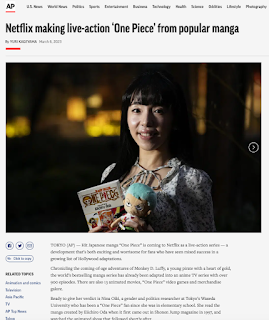AP interview on anime, Hollywood, "The Art of Blade Runner: Black Lotus"--and that new "One Piece" adaptation, out August 31
Belated thanks to Yuri Kageyama of the Associated Press for her story about Hollywood anime adaptations that grew out of my FCCJ event for the new Blade Runner: Black Lotus book. This article was published well before the live-action Saint Seiya movie (called Knights of the Zodiac, btw) dropped and disappeared, and word from the One Piece set ain't so great either. (Original mangaka Eichiro Oda apparently has a lot of notes.)
You can read Yuri's full article here. It was a particular honor for me to be featured alongside one of my former students, Nina Oiki, for whom I was happy to sign a book at the press club.
Excerpt: "The cross-pollination of Hollywood and Japan goes back for decades. References to Japan, such as the image of a geisha on a screen, are plentiful in the 1982 sci-fi movie “Blade Runner,” directed by Ridley Scott.
The film, in turn, influenced anime, including the “Blade Runner: Black Lotus” anime that first aired in 2021.
Japanese pop culture expert Roland Kelts says it’s a “stunning moment for anime,” in part due to streaming on platforms like Netflix, which has helped make entertainment borderless.
Anime has a low production cost compared to live-action films, and computer-generated heroes don’t get sick or injured or make offensive remarks offscreen like real-life actors sometimes do, making it a marketable medium, said Kelts, author of “Japanamerica,” which documents Japanese pop culture's influence in the United States.
“They are stylized and stateless characters. What I mean by that is that anime characters travel globally very, very well,” Kelts said. “The human celebrities don’t always travel so well."
Established bestsellers offer the advantage of a built-in fanbase, but they also come with strict scrutiny. Some, like “Ghost in the Shell,” have been criticized for “whitewashing” the Asian original. The 1995 animated movie was made into a Hollywood live-action in 2017 amid complaints about casting white American actor Scarlett Johansson as the main character — though Asia largely stayed out of the debate."



.jpg)